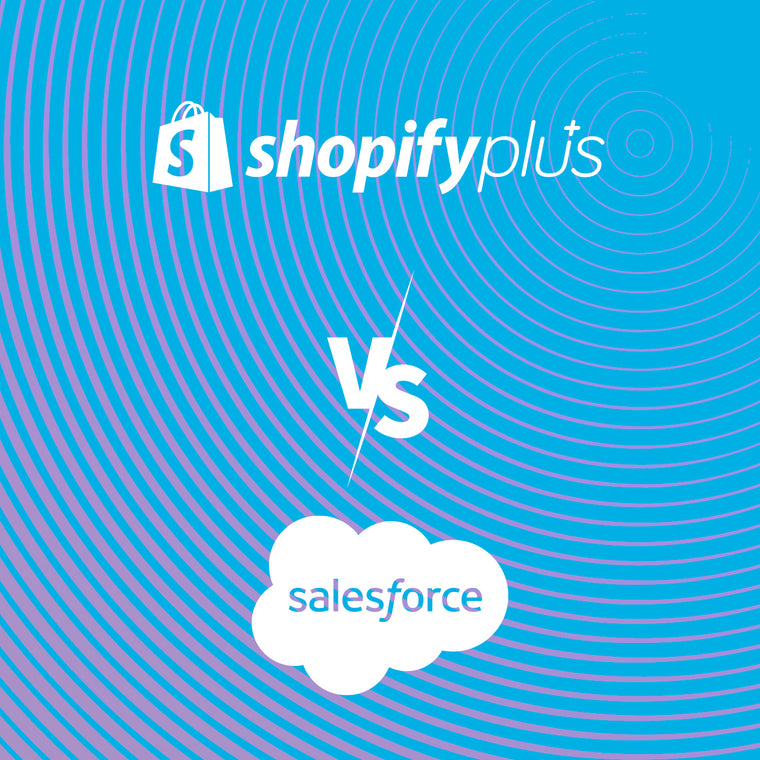Shopify Plus vs Salesforce: Which Platform is the Best for My Business?
In the fast-paced world of eCommerce, choosing the right platform for your business is crucial for success. Two prominent contenders in the market are Shopify Plus and Salesforce, specifically Salesforce Commerce Cloud.

While Shopify Plus has established itself as a leading eCommerce platform, Salesforce Commerce Cloud, often referred to as Salesforce, has gained recognition for its comprehensive suite of CRM and commerce solutions.
Click on the relevant link to jump to that section:
- What are the Main Differences Between Shopify Plus and Salesforce?
- What are the Pros and Cons of Salesforce?
- What are the Pros and Cons of Shopify Plus?
- Which Platform is Better for my Business?
- How Absolute Design Can Help
best fit for their needs. In this guide, we will dive deep into the features, functionalities, and benefits of Shopify Plus and Salesforce Commerce Cloud, equipping you with the knowledge to make an informed decision. Whether you are a seasoned entrepreneur or a growing business, join us as we explore Shopify Plus vs. Salesforce and help you determine the eCommerce platform that is best suited for your business.
What are the Main Differences Between Shopify Plus and Salesforce?
Both Shopify Plus and Salesforce Commerce Cloud share some common features, including easy access to customer support, fully managed SaaS solutions, and a great user experience. However, they also have notable differences that business owners should consider when choosing the right platform.
In terms of merchandising, Salesforce Commerce Cloud offers advanced capabilities for product catalogue management, personalisation, and promotion. It provides robust tools to create targeted marketing campaigns and optimise the customer journey. Shopify Plus, on the other hand, focuses on simplicity and user-friendliness, offering intuitive merchandising features suitable for businesses of all sizes.
When it comes to pricing, Shopify Plus has a straightforward and transparent pricing structure. It offers a fixed monthly fee, allowing businesses to scale without worrying about additional costs per transaction. In contrast, Salesforce Commerce Cloud follows a customised pricing model, which can vary depending on factors such as business size, requirements, and implementation scope.
In terms of apps and integrations, Shopify Plus has a vast marketplace of apps and integrations, offering a wide range of tools and extensions to enhance store functionalities. Salesforce Commerce Cloud also provides a selection of integrations, including its own ecosystem of Salesforce products. However, Salesforce Commerce Cloud may require more complex integrations and custom development to connect with third-party systems.
Scalability is a key differentiator as well. Shopify Plus is known for its ability to handle high traffic volumes and support rapid business growth, offering a scalable infrastructure that adapts to increasing demands. Salesforce Commerce Cloud, leveraging the power of Salesforce's enterprise-level CRM, provides robust scalability and handles complex business operations seamlessly.
Customisation is another area where the platforms differ. Shopify Plus offers extensive customisation options through its Liquid templating language, empowering businesses to create unique storefronts and tailor the customer experience. Salesforce Commerce Cloud, on the other hand, provides more comprehensive customisation capabilities, allowing businesses to leverage the Salesforce CRM and build personalised experiences.
When it comes to themes, Shopify Plus offers a wide range of professionally designed themes that are visually appealing and easy to implement. Salesforce Commerce Cloud offers a selection of themes as well, but customisation options may require more technical expertise.
In terms of customer support, both platforms offer reliable support channels. Shopify Plus provides 24/7 support via chat, email, and phone, ensuring prompt assistance. Salesforce Commerce Cloud offers robust support through its extensive knowledge base, community forums, and direct support options.
Lastly, user experience differs between the platforms. Shopify Plus is known for its intuitive and user-friendly interface, making it easy for users to set up and manage their stores. Salesforce Commerce Cloud offers a comprehensive set of tools, but the learning curve may be steeper due to its enterprise-level capabilities and complexity.
Considering these differences, business owners should carefully assess their specific requirements, scalability needs, customisation preferences, and budget to determine whether Shopify Plus or Salesforce Commerce Cloud is the best fit for their eCommerce business.
What are the Pros and Cons of Salesforce?
Salesforce, as a widely recognised CRM platform, comes with its own set of pros and cons. One of the significant pros of Salesforce is its powerful CRM functionality. It offers comprehensive customer relationship management features, including lead management, opportunity tracking, and customer service automation, empowering businesses to effectively manage their customer interactions and improve sales processes.
Another advantage is the customisability of Salesforce. It provides a range of customisable features and modules, allowing businesses to tailor the platform to their specific needs and workflows. Additionally, Salesforce is often considered less expensive to implement compared to other platforms, as it offers flexible pricing options and scalable solutions suitable for businesses of all sizes.
However, there are some drawbacks to consider. One of the cons is that to fully unlock the potential of Salesforce, businesses often need to invest in additional add-ons and extensions. These add-ons can add to the overall cost and may be required to access certain advanced features or integrations. Another limitation is that the configuration of Salesforce can be complex and time-consuming, especially for businesses with unique requirements or complex workflows.
Adequate planning, expertise, and resources are often needed to set up and customise the platform effectively. Additionally, Salesforce has garnered a reputation for poor customer service in some cases, with users reporting challenges in receiving timely and satisfactory support.
Taking these pros and cons into account, businesses should carefully evaluate their specific CRM needs, budget, and internal resources to determine if Salesforce is the right fit for their organisation.
Customer satisfaction is of paramount importance to our team at Absolute Design

What are the Pros and Cons of Shopify Plus?
Shopify Plus, as an eCommerce platform, comes with its own set of pros and cons that differentiate it from Salesforce. One of the notable pros of Shopify Plus is its impressive flexibility. It offers a wide range of customisation options, allowing businesses to create unique and visually appealing storefronts that align with their brand identity.
Additionally, Shopify Plus is known for its reliable platform, providing stable and secure hosting infrastructure to handle high volumes of traffic and transactions without performance issues. Furthermore, Shopify Plus delivers fast and smooth performance on any device, ensuring a seamless shopping experience for customers across various devices and screen sizes.
However, there are some cons to consider as well. One limitation of Shopify Plus is the more restricted backend customisation compared to platforms like Salesforce. While Shopify Plus offers a variety of themes and customisation options for the storefront, extensive modifications to the backend may require more technical expertise and custom development.
Another drawback is the limitations in terms of wholesale functionality. While Shopify Plus provides basic wholesale features, it may not be as comprehensive or tailored to complex wholesale operations compared to dedicated wholesale platforms. Additionally, Shopify Plus has certain content management limitations. While it offers basic content management capabilities, it may not be as robust or feature-rich as dedicated content management systems or platforms like Salesforce.
Comparing these pros and cons with Salesforce, Shopify Plus excels in terms of its user-friendly customisation options, reliable performance, and responsive design. However, Salesforce may have an edge in terms of backend customisation capabilities, wholesale functionality, and content management features. Ultimately, businesses should carefully evaluate their specific eCommerce needs, scalability requirements, and budget to determine whether Shopify Plus or Salesforce is the best fit for their online store.
Which Platform is Better for my Business?
Choosing the best platform for your business depends on several factors, including the size of your business, whether you operate in a B2B or B2C environment, the nature of your products or services, and your target market. If you have a small or medium-sized business, Shopify Plus could be a favourable choice due to its user-friendly interface, customizable storefronts, and reliable performance.
It offers a range of features suitable for both B2B and B2C businesses, providing flexibility in catering to different customer segments. Additionally, Shopify Plus is well-suited for businesses selling physical products, digital goods, or services, and it supports various sales channels, including online marketplaces, social media platforms, and brick-and-mortar stores.
While Salesforce Commerce Cloud offers robust CRM functionality and advanced customisation options, it may be more suitable for larger enterprises with complex backend requirements and extensive customisation needs. It is important to consider revenue as well since Shopify Plus offers a scalable pricing model that allows businesses to grow without significant increases in costs. However, it is essential to evaluate your specific business needs and consult with experts to make an informed decision that aligns with your long-term growth objectives.
How Absolute Design Can Help
As experienced Shopify experts, we can help with the design and planning, and development and support of your website. Have a look at our services that we can provide, and get in touch with us for more information.
